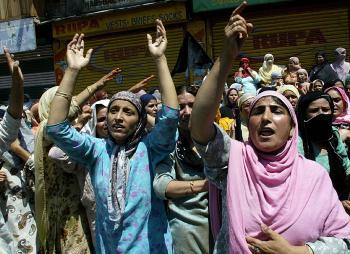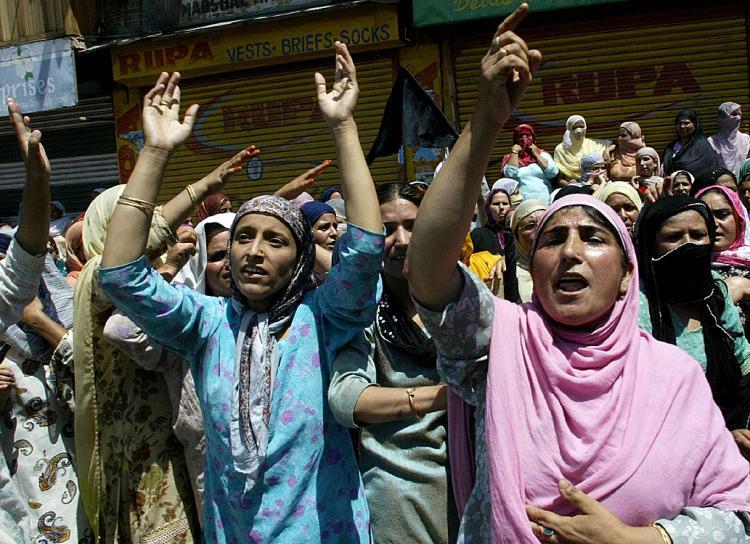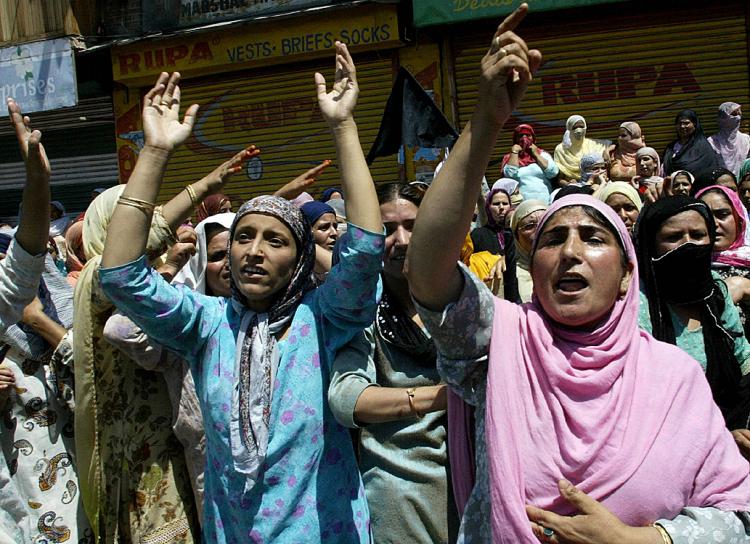Hundreds of trucks and buses brought the protesters, many of them sitting on roofs and hanging out of windows, for an independence rally addressed by separatist leaders.
“There is no God but Allah” and “Indian forces go back”, the protesters shouted.
What began as a dispute over land for Hindu pilgrims visiting a shrine in Kashmir snowballed into full-scale anti-India protests this month, boosting separatists who want India’s only Muslim-majority region to secede.
Police and soldiers dressed in battle gear patrolled the streets as about 350,000 protesters arrived from nearby towns and villages, officials said.
“Today’s rally is a referendum that Kashmiris want their inalienable right to self-determination,” Mirwaiz Umar Farooq, chairman of All Parties Hurriyat (Freedom) Conference, said in his address to the crowd.
Thousands of people lined both sides of the road cheering protesters and offering them food, water and juice.
Police have killed at least 23 Muslim protesters and more than 500 have been injured in clashes in two weeks of demonstrations in Kashmir Valley. Protests were halted for three days, until Friday, to allow Kashmiris to stock up on rations.
The protests are some of the biggest since a separatist revolt against Indian rule broke out in the region in 1989. Tens of thousands of people were killed in that revolt.
“I have never seen a larger demonstration in my life,” said protester Abdul Rehman, 90. “It looks Kashmir is drifting away from India this time.”
The crisis has strained relations between India and Pakistan, who both claim the region in full but rule it in parts. It has also raised fears of communal tension in the state, split between the Hindu-majority Jammu region and the Muslim Kashmir Valley.
Muslim vs Hindu
“We appeal to people to march to Eidgah (ground), to remember and pay homage to martyrs,” a joint statement from Kashmiri separatists said. “And to protest Indian occupation and pray for Kashmir’s secession.”
Eidgah, a sprawling ground for mass Eid prayers, lies in central Srinagar adjacent to a “martyrs’ graveyard”, a cemetery where militants and civilians are among those buried.
The dispute began after the state government promised to give forest land to the Hindu trust that runs the cave shrine of Amarnath. Many Muslims were enraged, leading the state government to rescind its decision.
That in turn angered Hindus in Jammu, where thousands have protested the rescinding of the land order and criticised the government for “pandering to separatists”.
At least 10 people have also been killed in weeks of protests Jammu, where Hindus attacked trucks carrying supplies to the Kashmir Valley and often blocked the region’s highway, the only surface link with the rest of India.
Kashmiri Muslims, challenging what they said was an economic blockade, then took to the streets to protest.
Adding to tension in the region, India has criticised Pakistan for interfering in its internal affairs by calling for U.N. intervention in Kashmir.
A wave of bomb attacks elsewhere in India last month and the Kashmir protests have also threatened a four-year-old peace process between nuclear-armed India and Pakistan.
Two militants and an Indian soldier were killed on Friday in a gun battle near the U.N.-monitored ceasefire line with Pakistan that splits Kashmir.
Militant violence has fallen in recent years but people are still killed in near daily gun battles and bomb attacks in Kashmir.






